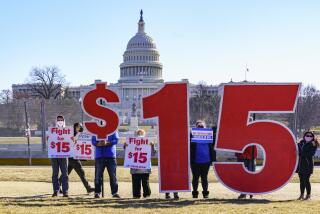Hard Line on Strikes : Brazil Boosts Minimum Wage
- Share via
RIO de JANEIRO — After a surprisingly sharp drop in inflation in April, Brazil’s new democratic government has taken a hard line against a wave of strikes and announced a parsimonious increase in the national minimum wage.
The new minimum wage, announced Monday night on television, represents the first big political decision by President Jose Sarney, the former vice president who took over as head of Brazil’s coalition government after President-elect Tancredo Neves, who never took office, died April 21.
Sarney’s decision to follow a course of austerity and avoid a bid for populist applause reinforced the government’s goal of seeking to refinance about half the country’s $100-billion foreign debt and negotiate a new stabilization program with the International Monetary Fund.
The Brazilian authorities deliberately avoided the wage policy adopted by President Raul Alfonsin of Argentina, who granted big wage increases without reducing budget deficits. As a result, inflation in Argentina is now running at an annual rate of close to 800%.
In Brazil, which is one of the world’s 10 largest industrial economies and has a population of 130 million, inflation drove prices up 227% last year. The military-backed government of former President Joao Figueiredo failed in its effort to reduce inflation because it did not cut public deficits, which built up an internal debt of $30 billion.
Finance Minister Francisco Dornelles plans to make a major policy presentation to the Brazilian Congress next week and then go to Washington and New York to begin negotiations with the IMF and the international banks that hold Brazil’s debt.
The minimum wage, which is adjusted every six months, affects all public and private labor contracts and more than 30 million organized workers. For the past four years, a period of deep economic recession, workers’ wages have not kept pace with rising prices. The decline in real wages is estimated at more than 30%.
Pressure for Increase
There was considerable pressure on the new government for a major increase in the minimum wage, but Neves urged restraint, arguing that increased inflation would have more impact on wage earners than on the rich.
Neves died after seven abdominal operations that began on the eve of his Inauguration Day, March 15. The reversal of Brazil’s spiraling inflation last month can be attributed to his order, issued from his hospital bed, to reduce public spending. The cost of living rose 7.2% in April, compared to 12.6% in March.
The decision to hold the minimum-wage increase to 106% of the level of six months ago--less than the inflation for the past six months--reinforces the position of Finance Minister Dornelles, who held out for austerity against arguments for a larger increase by Labor Minister Almir Pazzianotto.
The new minimum wage is 336,000 cruzeiros a month, or about $65, and, according to Walter Barelli, who heads an economic study group financed by labor unions, it “is not enough to feed a family of four.”
The new government, after 21 years of military-backed authoritarian regimes, is facing a wave of strikes, led by automotive workers in the state of Sao Paulo. More than 400,000 workers have been involved in sit-downs, work stoppages and other forms of pressure.
Sarney, 54, heard not only Pazzianotto but also congressional leaders argue for a larger wage increase. His decision, despite warnings of a possible “social explosion” if workers are not given relief from inflation, means an extended period of belt tightening for workers, but the new government is promising to continue to reduce budget deficits and reduce high interest rates as the best way to beat inflation.
It is also extending more credit to farmers in an effort to increase food production, and it is planning an emergency feeding program for children.
More to Read
Sign up for Essential California
The most important California stories and recommendations in your inbox every morning.
You may occasionally receive promotional content from the Los Angeles Times.










